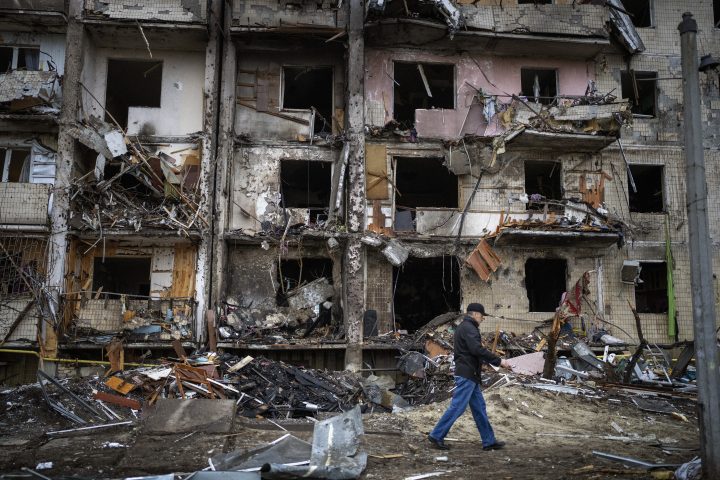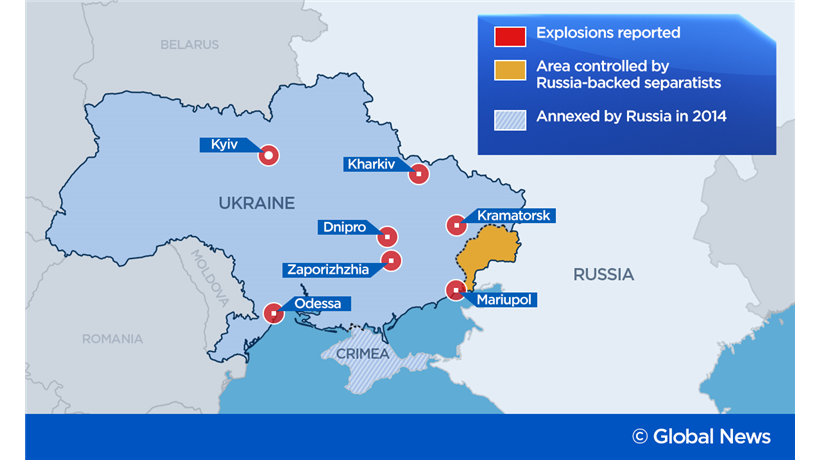The latest as of 7.08 a.m. ET Sunday:

- Ukrainian president says his country is ready for peace talks with Russia but not in Belarus as selected by the Kremlin.
- Shells have hit a radioactive waste disposal site in Kyiv, Ukrainian officials said, and it is currently not possible to know the extent of the damage.
- The SWIFT international payments system says it is preparing to implement Western nations’ new measures targeting certain Russian banks in coming days.
- A Ukrainian road-building company said it was removing all road signs that could be used by invading Russian forces to find their way around the country.
- The Ukrainian president’s office said Russian forces blew up a gas pipeline in Kharkiv, the country’s second-largest city.
Western nations have announced that select Russian banks will be removed from the SWIFT banking system as Russian troops continued to pound Ukraine‘s capital of Kyiv.
The exclusion from SWIFT has been described as a “financial nuclear weapon” by France’s finance minister because of the damage it can cause to Russia’s economy.
The system is used by 11,000 financial institutions in over 200 countries. It will make transactions more difficult and costlier for Russia when it is excluded.
SWIFT, or the “Society for Worldwide Interbank Financial Telecommunication,” is a secure messaging network that facilitates rapid cross-border payments, making it a crucial mechanism for international trade.

The EU, France, Germany, Italy, the U.K., Canada, and the U.S. announced the move Saturday in a joint statement released by the White House. The payments system says that it is preparing to implement the new measures in the coming days.
The countries also said they will impose measures to restrict the Russian Central Bank from deploying its international reserves to undermine other sanctions.
They said in the statement that the removal from SWIFT will “ensure that these banks are disconnected from the international financial system and harm their ability to operate globally.”
EU Commission President Ursula von der Leyen said cutting banks off would “effectively block Russian exports and imports.”
“Putin embarked on a path aiming to destroy Ukraine, but what he is also doing, in fact, is destroying the future of his own country,” she said.
Prime Minister Justin Trudeau said Canada “strongly supports” the removal of Russian banks from the SWIFT system.
A senior Biden official said Saturday that western allies are “disarming Fortress Russia.” The U.S. will also sanction two of Russia’s largest banks — the state-backed Sberbank and VTB.
The official said the actions are meant to prevent Russia from using $630 billion in central bank foreign currency reserves to aid the invasion of Ukraine.
The financial sanctions came as heavy fighting was reported across Kyiv, with explosions and artillery blasts heard in several neighbourhoods and on the outskirts of the city. Central Kyiv appeared quiet during the day Saturday, though sporadic gunfire could be heard.
Ukrainian officials said early Sunday morning local time that shells hit a radioactive waste disposal site in Kyiv and the extent of damage is not known.
The capital is currently under a prolonged curfew that will run from 5 p.m. to 8 a.m.
Huge explosions lit up the predawn sky south of Kyiv early Sunday, with one of the blasts occurring near the Zhuliany airport, according to Ukrainian President Volodymyr Zelenskyy’s office.
The office also said Russian forces have blown up a gas pipeline in Kharkiv, Ukraine’s second-largest city located near the Russian border, and warned that the explosion could cause an “environmental catastrophe.” A fierce battle for the city is currently underway.
The mayor of Vasylkiv, about 40 kilometers south of Kyiv, said an oil depot there was also hit.
Despite the ongoing assault, the U.K.’s Ministry of Defence said Saturday evening that “Russian forces are not making the progress they had planned.”
“They are suffering from logistical challenges and a strong Ukrainian resistance.”
A number of Russian troops have been taken prisoner by Ukrainian forces, according to the ministry.

Ignoring weeks of warnings from Western leaders, Russian President Vladimir Putin launched the invasion of Ukraine on Thursday from the north, east and south.

Get breaking National news
Russia claims its assault on Ukraine is aimed only at military targets, but civilians have been killed and injured during Europe’s largest ground war since World War Two.
As of Saturday, at least 240 civilians were killed, according to the U.N.
Ukraine’s Ministry of Defence said at least six children have died, more than 1,100 people have been injured, including more than 100 children, and more than 350 civil infrastructure facilities have been destroyed.
The ministry also said that since Feb. 25, there has been an increase in the number of bombings of medical and educational institutions.
The conflict has forced nearly 150,000 Ukrainians to flee their homes for Poland, Moldova and other neighbouring countries, the UN Refugee Agency said, and warned that number could grow to 4 million if fighting escalates.
Fighting was underway on Saturday near the southern Ukrainian cities of Mariupol, Kherson, Mykolaiv, and Odesa, an adviser to the Ukrainian president’s office said. The military said Russian cruise missiles had also launched from the Black Sea.
Residents take shelter
Kyiv remains a key target, with Ukraine and the West saying that Vladimir Putin aims to topple the Ukrainian government by force. Zelenskyy has said that he is Russia’s number one target and his family is number two.
Despite pleas from the U.S. to leave Kyiv, he has decided to stay and has posted videos to social media of him on the streets.
Kyiv’s government shared a picture of damage to what it said was a residential building in the Solomianskyi district of the city. The state emergency agency said there were no casualties.
Officials in Kyiv urged residents to seek shelter, to stay away from windows and to take precautions to avoid flying debris or bullets. Many spent Friday night in basements, underground parking garages and subway stations, and prepared to do the same on Saturday.
Olga Fayziyeva, a Kyiv resident who moved to her parents’ apartment in the capital after her brother and husband signed up with the Ukrainian forces, said it was “unimaginable” to see the crisis unfold in her country.
President Volodymyr Zelenskyy said the capital remained in the hands of Ukrainian forces who were able to resist the Russian advance and the situation was under control.
“We have withstood and are successfully repelling enemy attacks. The fighting goes on,” Zelenskyy said in a video message posted on his social media.
“We will win,” he said, accusing Russia of hitting infrastructure and civilian targets.
Ukraine’s military said as of Saturday, 3,500 Russian troops had been killed and nearly 200 were taken as prisoners, although those numbers have not been confirmed.
Ramzan Kadyrov, the leader of Russia’s Chechnya region and an ally of Putin, said on Saturday Chechen fighters had been deployed in Ukraine and urged Ukrainians to overthrow their government.
“(Putin) took the right decision and we will carry out his orders under any circumstances,” said Kadyrov said in a video posted online.
Putin has not disclosed his ultimate plans for Ukraine or how long the Russian military operation could last.
Both Putin and Zelenskyy spoke of possible talks on Friday.
Zelenskyy’s press department told Global News that the president is still open to negotiating with Putin.
“He is ready to negotiate. He wants peace through negotiations, not death,” a spokesperson from Zelenskyy’s office said Saturday.
However, the Kremlin said Russian troops started advancing into Ukraine again on Saturday after Putin paused the offensive a day earlier in anticipation of talks with Kyiv that never happened.
Kremlin spokesperson Dmitriy Peskov said that after Putin’s order, Russian troops only clashed with “groups of nationalists” as opposed to regular Ukrainian forces.
Meanwhile, Russia’s defence ministry claimed its troops had taken control of the city of Melitopol in Ukraine’s southeast, where intense fighting had been reported earlier Saturday. Ukraine has yet to verify the claim.
Moscow said on Friday it was partially limiting access to Facebook, accusing the social media giant of “censoring” Russian media and violating the “rights and freedoms of Russian citizens” amid the conflict.
On Saturday, Twitter said its site was also being restricted for some users in the country. The U.K.’s ministry of defence said Russia is reportedly restricting access to a number of social media platforms in a “probable” attempt to conceal details of what is happening in Ukraine.
According to OVD-Info, a rights group that tracks political arrests, at least 460 people in 34 cities in Russia were detained over anti-war protests on Saturday, including over 200 in Moscow.
The official website of the Kremlin, the office of Russian President Vladimir Putin, kremlin.ru, was also down on Saturday, while YouTube moved to suspend multiple Russian channels, including state-funded media outlet RT, from generating revenue on the video service.
International support
Putin sent troops into Ukraine after spending weeks denying he intended to invade. A force of almost 200,000 troops had been amassed along the countries’ borders.
Putin claims the West has failed to take seriously Russia’s security concerns about NATO, the Western military alliance that Ukraine aspires to join. He has also expressed scorn about Ukraine’s right to exist as an independent state.
In response to the Russian aggression, the United States and other NATO allies have sent weapons and other aid to Ukraine, which is not a NATO member. NATO member nations also have beefed up their troops in allied countries in Eastern Europe but ruled out deploying troops to fight Russia.
U.S. Secretary of State Antony Blinken said Saturday he had authorized an additional $350-million in immediate military assistance to Ukraine “to help defend itself from Russia’s unprovoked and unjustified war.”
The Netherlands will supply 50 Panzerfaust-3 anti-tank weapons and 400 rockets, the Dutch Defence Ministry said in a letter to parliament. In a shift of policy, Germany announced it is sending 1,000 anti-tank weapons and 500 “Stinger” surface-to-air missiles to Ukraine “as quickly as possible.”
The U.S., Canada, the European Union and other countries have also slapped wide-ranging sanctions on Russia, freezing the assets of Russian businesses and individuals including Putin and his foreign minister.
The E.U., France, Germany, Italy, the U.K., Canada, and the U.S. announced Saturday that in addition to removing “select” Russian banks from the SWIFT interbank payments system, the countries will also launch a “transatlantic task force” to implement financial sanctions by “identifying and freezing” assets of individuals and companies.
They will also limit the sale of citizenship, or “golden passports,” that they say allow wealthy Russians connected to the Kremlin to gain access to western financial systems.

Dmitry Medvedev, the deputy head of Russia’s Security Council chaired by Putin, on Saturday shrugged off a slew of previous economic measures as a reflection of Western “political impotence.”
On Saturday, French marines patrolling the English Channel area seized a Russian-flagged cargo ship carrying cars, that authorities suspect belongs to a company targeted by EU sanctions. The ship, which was headed for St. Petersburg, was intercepted and taken to the port of Boulogne-Sur-Mer for an investigation, Maritime spokesperson Veronique Magnin said.
The conflict appears to have hit a diplomatic stalemate.
On Friday, Russia vetoed a UN Security Council resolution demanding that it stop attacking Ukraine and withdraw troops immediately.
The 11-1 vote, with China, India and the United Arab Emirates abstaining, showed significant opposition to Russia’s invasion of its smaller, militarily weaker neighbour.
The security council will meet again Sunday afternoon to vote on a request an emergency session of the U.N.’s 193-member General Assembly. The vote will have no vetoes.
The UN Secretary-General Antonio Guterres said he spoke to the Ukrainian president on Saturday, telling him the world body plans to “enhance humanitarian assistance to the people of Ukraine.”
“Respect for international humanitarian law and the protection of civilians are now paramount,” he said on Twitter.
— with files from Global News’ Crystal Goomansingh, Reuters and the Associated Press










Comments